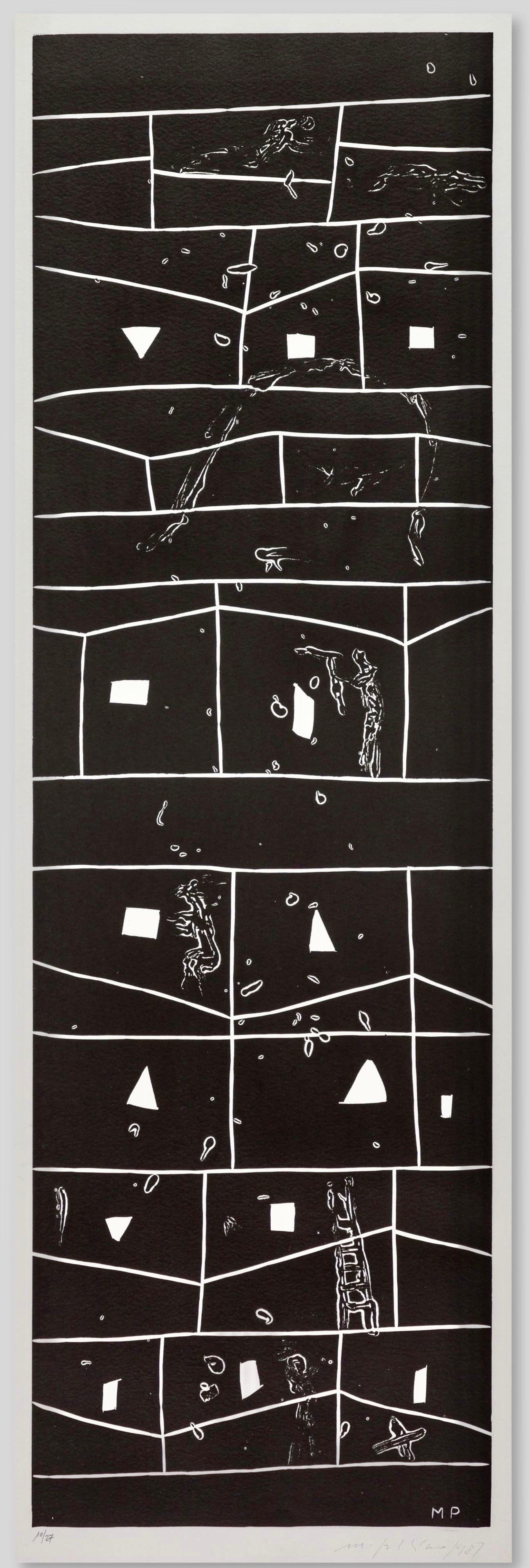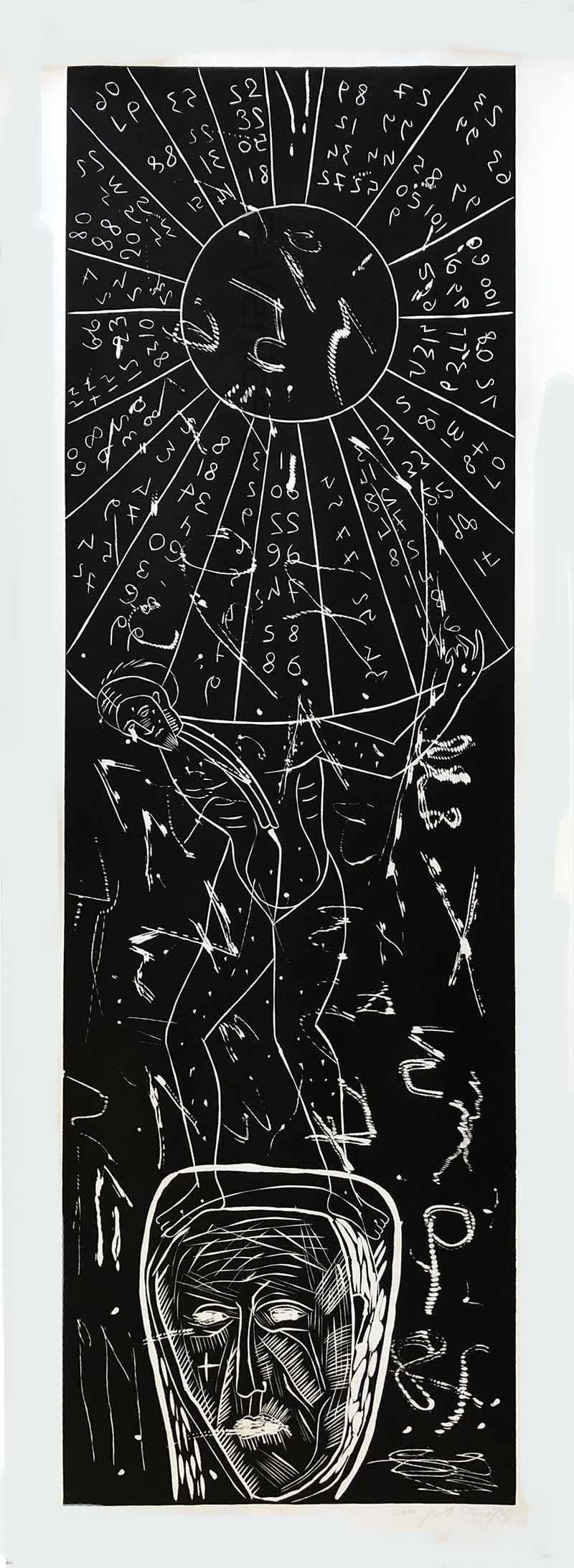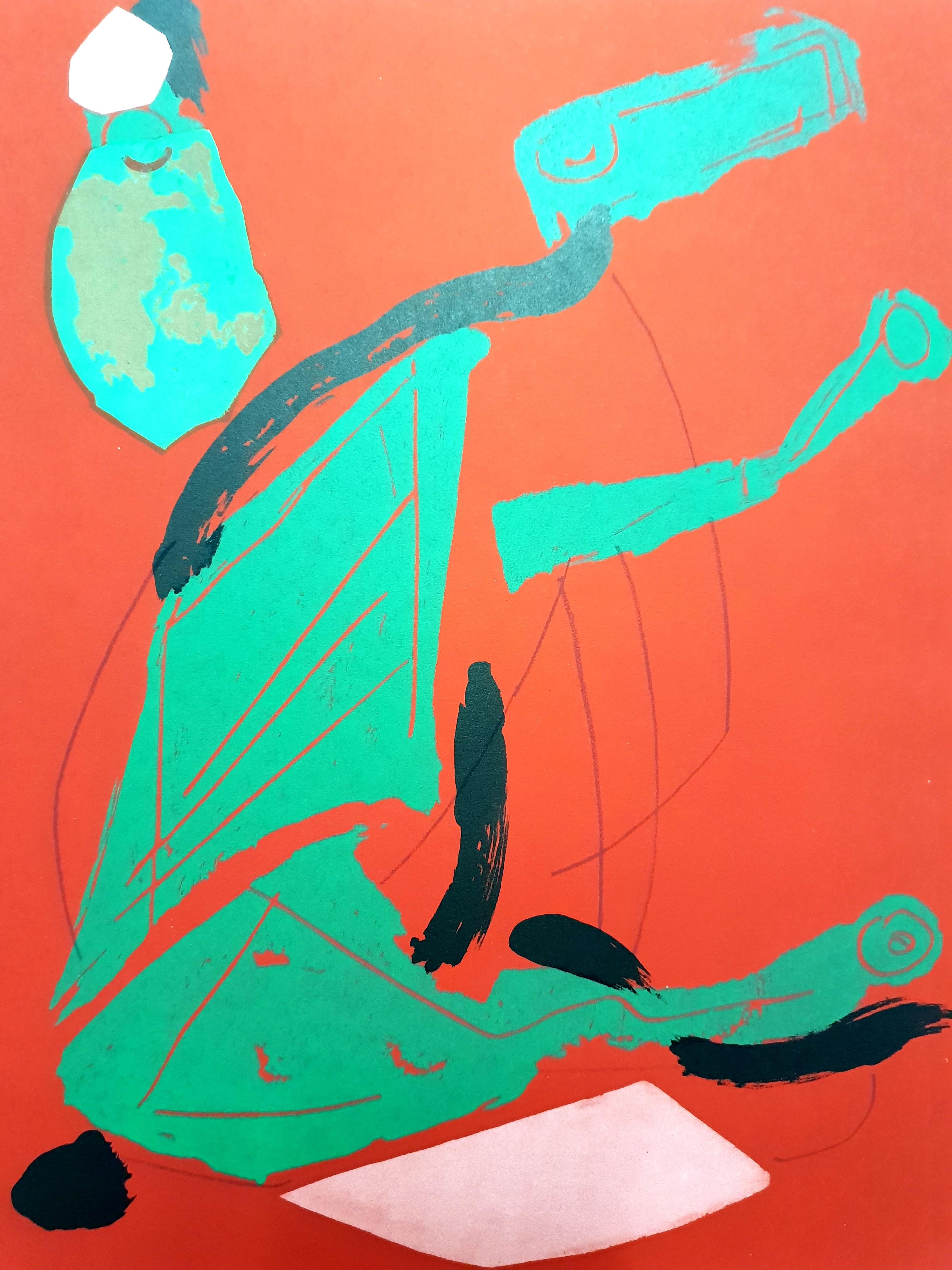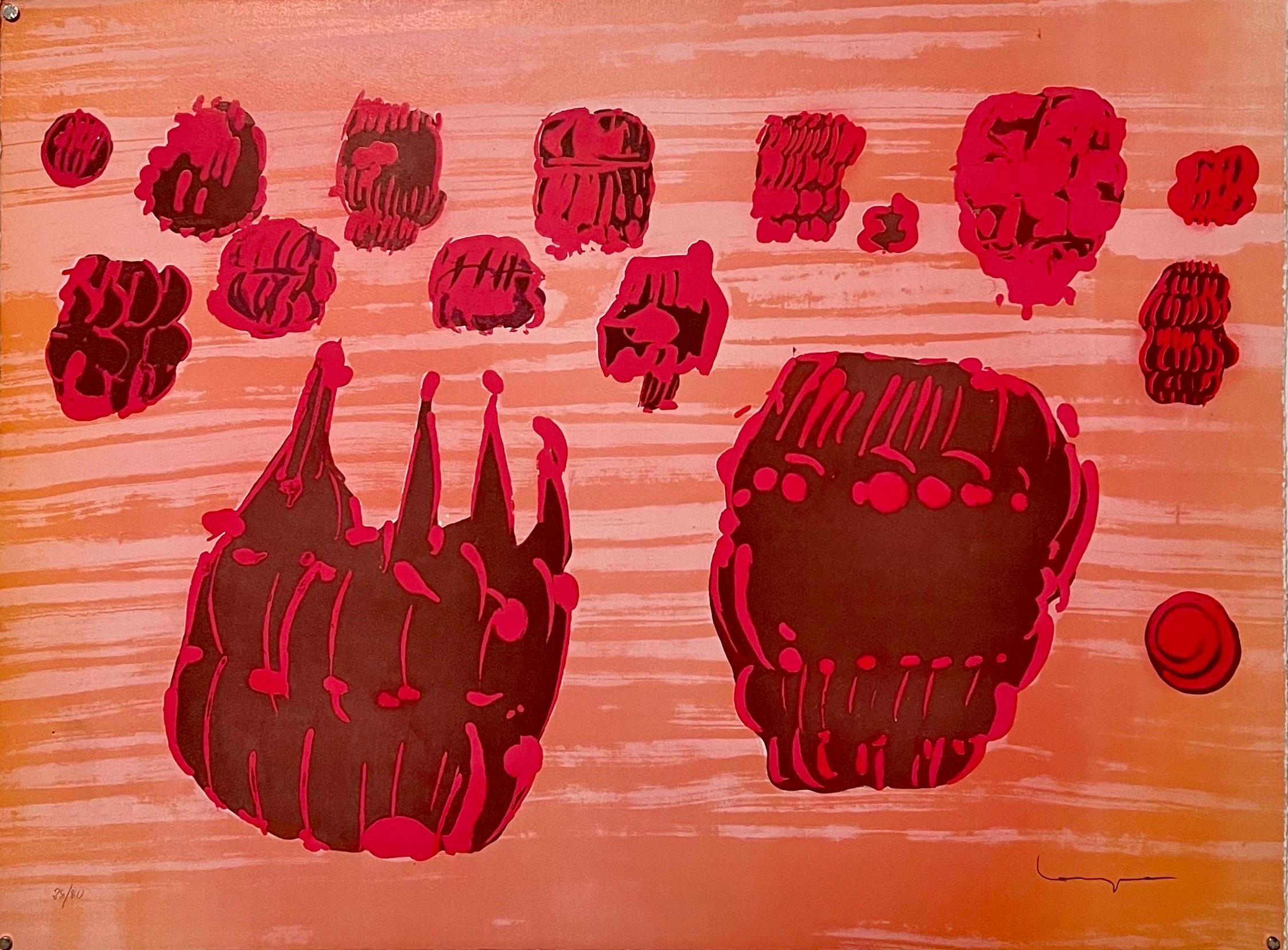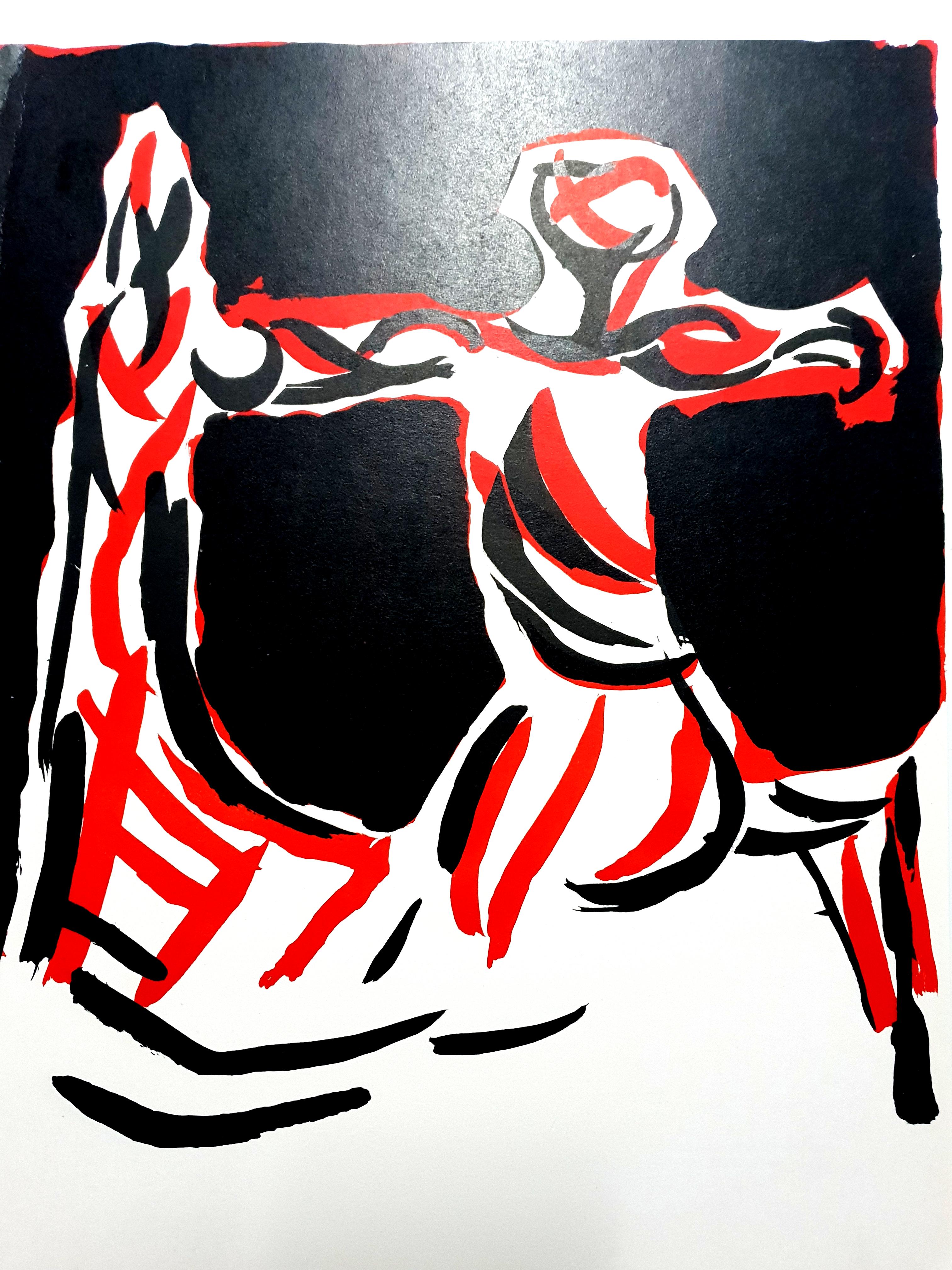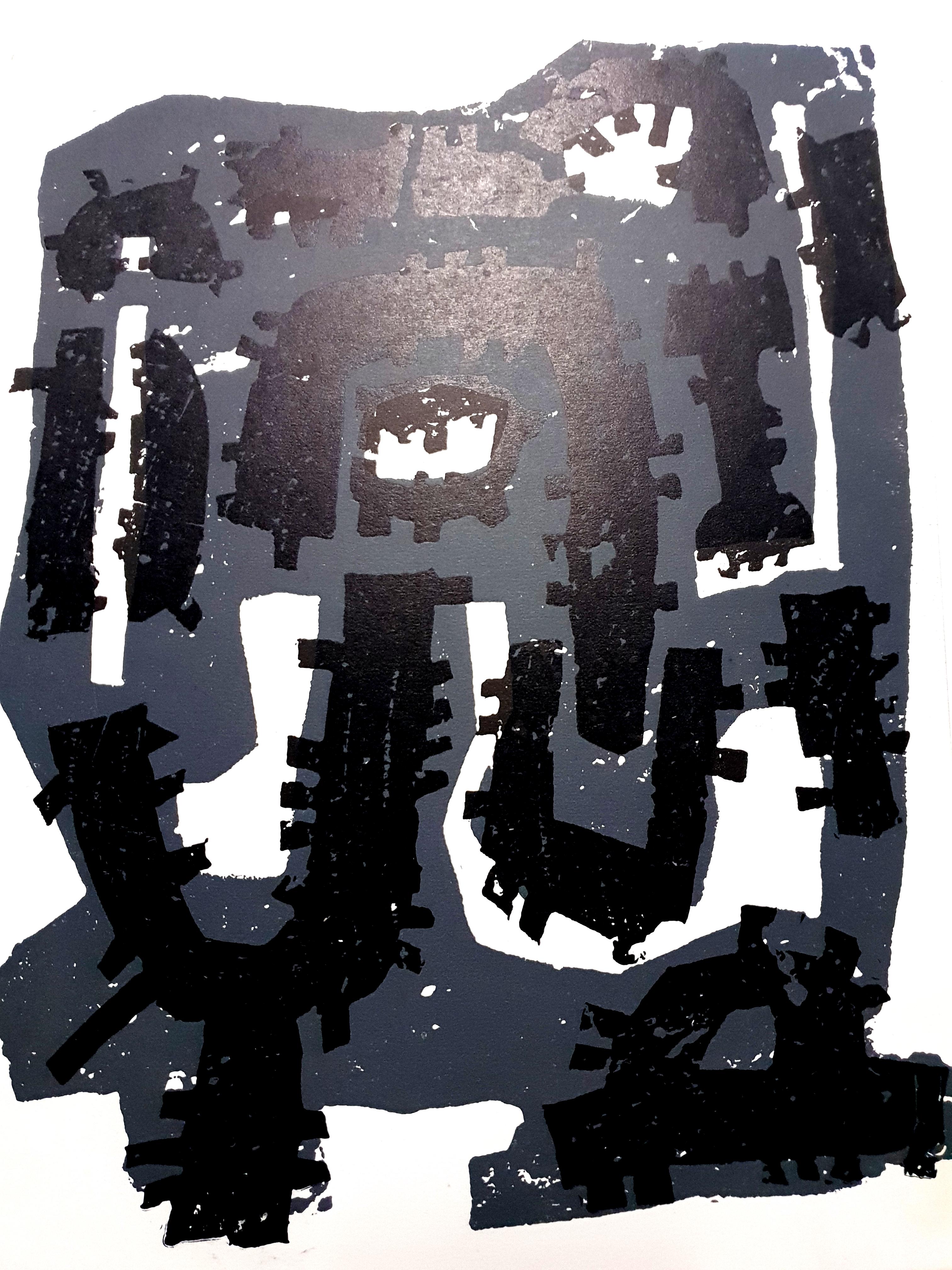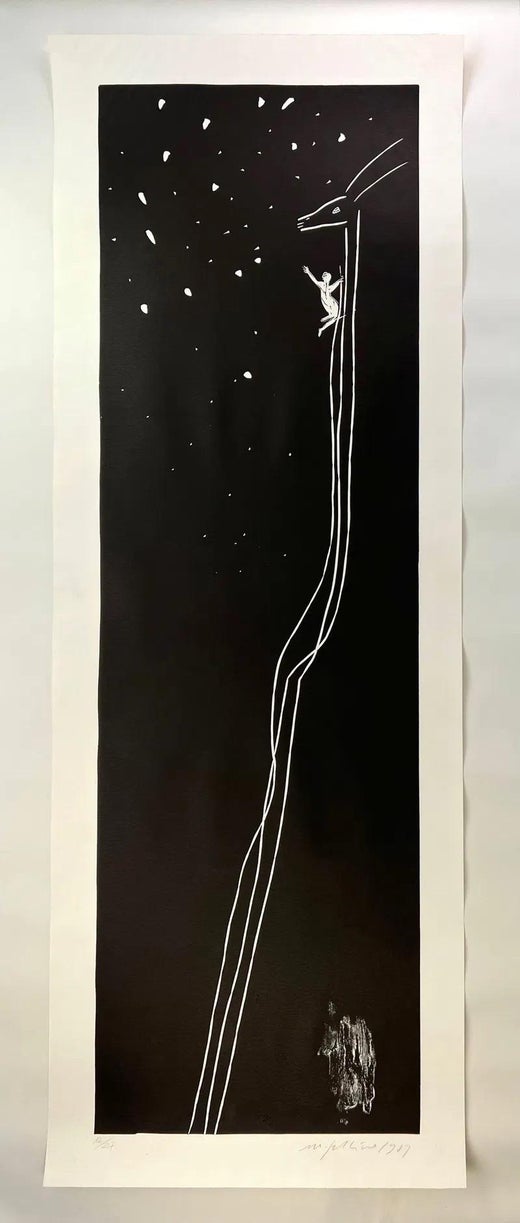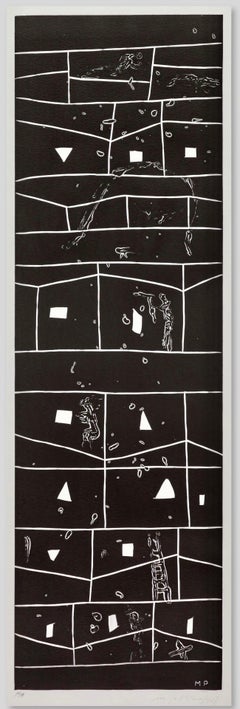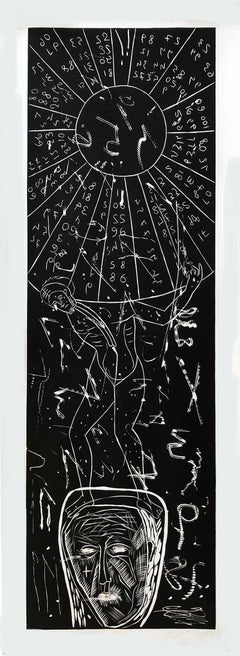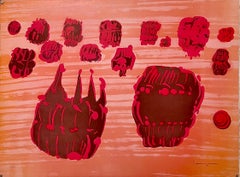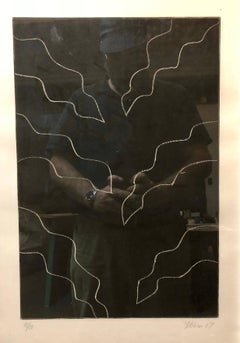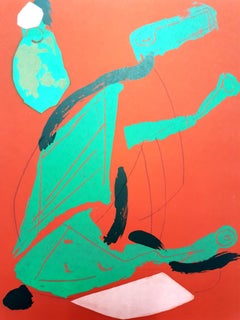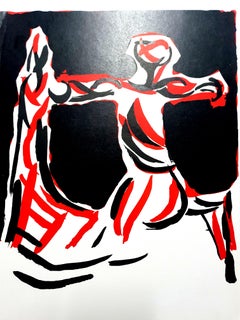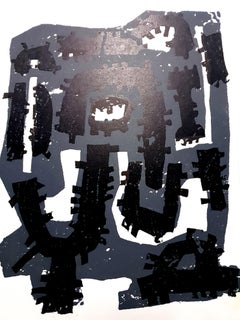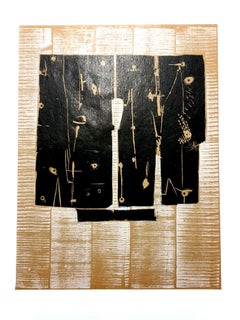Items Similar to Huge Italian Neo Expressionist Mimmo Paladino Linoleum Block Print Atlantico
Want more images or videos?
Request additional images or videos from the seller
1 of 14
Mimmo PaladinoHuge Italian Neo Expressionist Mimmo Paladino Linoleum Block Print Atlantico1987
1987
$5,500
£4,265.73
€4,835.05
CA$7,871.44
A$8,601.18
CHF 4,459.14
MX$102,753.29
NOK 56,745.23
SEK 53,126.99
DKK 36,104.28
About the Item
Mimmo Paladino
Atlantico
Linocut, 1987, hand signed, dated and numbered 12/27 in pencil.
Medium: Collagraph and linoleum cut
Sheet measures 82 x 29 1/2" inches
Parole Torchon paper
Published by Waddington Graphics, London
Giorgio Upiglio - Grafica Uno printer, Milan.
Publications: Mimmo Paladino's graphics by Enzo Di Martino, Ed. Art of this Century, n.104, p.125
Atlantico is a 1987 linocut print by Mimmo Paladino from the rare series of seven graphically charged prints, entitled Atlanico. This is from an edition of 27 plus artist and printers proofs. The large scale monochromatic, black and white print is hand signed by Paladino.
Mimmo Paladino (born in Paduli, Campania, Italy in 1948) is an Italian sculptor, painter and printmaker. He is a leading name in the Transavanguardia artistic movement and one of the many European artists to revive Expressionism in the 1980s.
From 1964 until 1968, he attended Liceo Artistico di Benevento where he was influenced by American pop art artists Claes Oldenburg and Jim Dine. He made his debut in 1968 with a solo exhibition at the Galleria Carolina in Portici in Naples. Here he was presented by Achille Bonito Oliva, who was also present for the monograph show at Enzo Cannaviello Studio Oggetto in Caserta the following year. However, we need to go back to 1964 to find the first major date in his artistic education. This was when, still a schoolboy, he visited the 32nd Venice Biennale and, in particular, the U.S. Pavilion, where he discovered the American Pop art artists. In the early 1970s, his approach shifted towards conceptual art and photography, but by the mid-decade his painting had acquired considerable importance.
In the late seventies, Paladino moved to Milan, where he later taught artistic disciplines at the Liceo school, while also working on his art. In 1977 came his first collaboration with Lucio Amelio, the historic gallery owner in Naples, and two years later he put on his first exhibition with another key gallerist, Emilio Mazzoli of Modena, for whom he made his first book-object – En-De-Re – in 1980. This was indeed another crucial year, for it was when he put on his first solo exhibition in New York (where he had just taken up temporary residence), in two different galleries – those of Marian Goodman and Annina Nosei. International interest in his work and in that of other young Italians was growing, and in 1980 a traveling exhibition took works by Sandro Chia, Francesco Clemente, Sandro Cucchi, Nicola De Maria and Paladino, together with two other artists, Luigi Ontani and Ernesto Tatafiore, to three of the most important museums in Europe. It was also the year of the 39th Venice Biennale, where Harald Szeemann and Achille Bonito Oliva curated the Aperto section, choosing some of the artists who were to make their mark on the art scene for many years to come. It was here that Transavanguardia became more firmly established, with its theoretical structure being published the following year. Regarded as the Italian version of Neo-Expressionism, Transavantgarde revived the emotion, figuration and mysticism in art. Paladino’s figurative sculptures, paintings and prints often reference past art historical traditions, modernizing iconography with distinct, graceful elongation.
The eighties were dominated largely by Neo-Expressionist paintings. There were Germans, such as Georg Baselitz, Anselm Kiefer, Gerhard Richter, A. R. Penck, and the Italians, Francesco Clemente, Sandro Chia, Enzo Cucchi, Mimmo Paladino as well as Julian Schnabel, Eric Fischl, Jean Michel Basquiat, David Salle, and many others, their paintings were figuratively based. There was a group of painters who were working more in the vein of what Stephen Westfall referred to as “Neo-Surrealism,” including George Condo, Jeffrey Wasserman, Kenny Scharf and David Humphrey. Clemente was in a photo with pop art master Andy Warhol, Jean-Michel Basquiat and Bruno Bischofberger in 1984. The arrival of the young Italian painters was seen by many as a breath of fresh air and a key exhibition like Zeitgeist, in Berlin, certainly indicated their progress, with German-speaking countries as the first to promote their work. he has forayed into sculpture (his first work, Closed Garden, is now at Castello di Rivoli) and engraving. However, his basic conception is always pictorial, even when three-dimensional, as in the case of It Will Have No Title, with the use of geometrical elements applied to the environment, the first result of which came in 1995. In 1994 he was the first Italian to exhibit in the Forbidden City in Beijing, China. In 2006 Paladino made his short feature film Quijote, devoted to the work by Cervantes. Presented at the Venice Film Festival, the movie captures the essence of the art of the masterpiece in a highly imaginative series of evocations, sounds and inventions. Great literature is an underlying thread that, over the years, has led him to illustrate the icons of world culture, such as Tristes Tropiques, Ulysses, the Homeric poems, Pinocchio and, of course, Don Quixote. Paladino was back behind the camera in 2013 to film Labyrinthus for the fourth centenary of the death of the madrigal composer Gesualdo da Venosa. Here too, his collaboration with the world of music goes back a long way, with numerous mises en scène for opera houses, the creation of opera posters for Maestro Riccardo Muti and requests for music for his installations, as was the case in 1999 with Brian Eno for Sleepers, in London and then, in 2008, for the Ara Pacis in Rome.
In 2013 he was commissioned to make a monumental installation for the Piazza Santa Croce in Florence, where he used blocks of marble and bronze sculptures for a large temporary project.
Paladino was made an honorary member of the Royal Academy of Arts, London on 26 May 1999.
His work is in many public museum collections including the Metropolitan Museum of Art, Tate, Museum of Modern Art, among others. Het has exhibited internationally, including at the 1980 Venice Biennale and the 1982 documenta VII. His work can be found in prominent collections worldwide, notably the Hirshhorn Museum and Sculpture Garden (Washington, D.C), Metropolitan Museum of Art (New York), Museum of Fine Arts (Houston) and Tate Modern (London).
- Creator:Mimmo Paladino (1948, Italian)
- Creation Year:1987
- Dimensions:Height: 82 in (208.28 cm)Width: 29.5 in (74.93 cm)
- Medium:
- Movement & Style:
- Period:
- Condition:this will ship rolled in a wide sturdy tube.
- Gallery Location:Surfside, FL
- Reference Number:1stDibs: LU38215825942
Mimmo Paladino
Mimmo Paladino (b. 1948, Italy) played a central role in the development of the Transavantgarde movement alongside Sandro Chia and Francesco Clemente. Regarded as the Italian version of Neo-Expressionism, Transavantgarde revived the emotion, figuration and mysticism in art. Paladino’s sculptures, paintings and prints often reference past art historical traditions, modernizing iconography with distinct, graceful elongation. Paladino attended the Benevento Art High School, where he was influenced by Pop artists Claes Oldenburg and Jim Dine. The artist has exhibited internationally, including at the 1980 Venice Biennale and the 1982 documenta VII. His work can be found in prominent collections worldwide, notably the Hirshhorn Museum and Sculpture Garden (Washington, D.C), Metropolitan Museum of Art (New York), Museum of Fine Arts (Houston) and Tate Modern (London).
About the Seller
4.9
Platinum Seller
Premium sellers with a 4.7+ rating and 24-hour response times
Established in 1995
1stDibs seller since 2014
1,833 sales on 1stDibs
Typical response time: 1 hour
- ShippingRetrieving quote...Shipping from: Surfside, FL
- Return Policy
More From This Seller
View AllHuge Italian Neo Expressionist Mimmo Paladino Linoleum Block Print Atlantico
By Mimmo Paladino
Located in Surfside, FL
Mimmo Paladino
Atlantico
Linocut, 1987, hand signed, dated and numbered 12/27 in pencil.
Medium: Collagraph and linoleum cut
Sheet measures 82 x 29 1/2" inches
Parole Torchon pap...
Category
1980s Neo-Expressionist Abstract Prints
Materials
Linocut
Huge Italian Neo Expressionist Mimmo Paladino Linoleum Block Print Atlantico
By Mimmo Paladino
Located in Surfside, FL
Mimmo Paladino
Atlantico
Linocut, 1987, hand signed, dated and numbered 12/27 in pencil.
Medium: Collagraph and linoleum cut
Sheet measures 82 x 29 1/2" inches
Parole Torchon pap...
Category
1980s Neo-Expressionist Abstract Prints
Materials
Linocut
Pietro Consagra Italian Mod Abstract Expressionist Forma Brutalist Lithograph
By Pietro Consagra
Located in Surfside, FL
Pietro Consagra (Italian, 1920-2005).
Hand signed in pencil and numbered limited edition color lithograph on Magnani paper.
Embossed stamp with limited edition numbers in pencil to lower left, and having artist pencil signature to lower right.
(from a limited edition of 80 with 15 artist's proofs)
Published by Stamperia 2RC, Rome Italy and Marlborough Gallery, Rome, Italy.
Abstract Modernist work in colors, produced in the style of the Forma art movement of Postwar Italy, of which the artist was a prominent member.
Pietro Consagra (1920 – 2005) was an Italian Post war artist working in painting, printmaking and sculpture. In 1947 he was among the founding members of the Forma 1 group of artists, proponents of structured abstraction.
Consagra was born on 6 October 1920 in Mazara del Vallo, in the province of Trapani in south-western Sicily, to Luigi Consagra and Maria Lentini. From 1931 he enrolled in a trade school for sailors, studying first to become a mechanic, and later to become a captain. In 1938 he moved to Palermo, where he enrolled in the liceo artistico; despite an attack of tuberculosis, he graduated in 1941, and in the same year signed up at the Accademia di Belle Arti, where he studied sculpture under Archimede Campini. After the Invasion of Sicily and the Allied occupation of Palermo in 1943, Consagra found work as a caricaturist for the American Red Cross club of the city; he also joined the Italian Communist Party. Early in 1944, armed with a letter of introduction from an American officer, he travelled to Rome. There he came into contact with the Sicilian artist Concetto Maugeri, and through him with Renato Guttuso, who was also Sicilian and who introduced him to the intellectual life of the city and to other postwar artists such as Leoncillo Leonardi, Mario Mafai and Giulio Turcato. Consagra signed up at the Accademia di Belle Arti di Roma in September 1944 and studied sculpture there under Michele Guerrisi, but left before completing his diploma.
In 1947, with Carla Accardi, Ugo Attardi, Piero Dorazio, Mino Guerrini, Achille Perilli, Antonio Sanfilippo and Giulio Turcato, Consagra started the artist's group Forma 1, which advocated both Marxism and structured abstraction.
Steadily Consagra's work began to find an audience. Working primarily in metal, and later in marble and wood, his thin, roughly carved reliefs, began to be collected by Peggy Guggenheim and other important patrons of the arts. He showed at the Venice Biennale eleven times between 1950 and 1993, and in 1960 won the sculpture prize at the exhibition. During the 1960s he was associated with the Continuità group, an offshoot of Forma I, and in 1967 taught at the School of Arts in Minneapolis. Large commissions allowed him to begin working on a more monumental scale, and works of his were installed in the courtyard of the Foreign Ministry in Rome and in the European Parliament, Strasbourg. His work is found in the collections of The Tate Gallery, London, in Museo Cantonale d'Arte of Lugano and the Museum of Modern Art, Paris, and the National Gallery of Art in Washington, D.C..
Consagra returned to Sicily where he sculpted a number of significant works during the 1980s. With Senator Ludovico Corrao, he helped created an open-air museum in the new town of Gibellina, after the older town had been destroyed in the earthquake of 1968. Consagra designed the gates to the town's entrance, the building named "Meeting" and the gates to the cemetery, where he was later buried.
In 1952 Consagra published La necessità della scultura ("the need for sculpture"), a response to the essay La scultura lingua morta ("sculpture, a dead language"), published in 1945 by Arturo Martini. Other works include L'agguato c'è ("the snare exists", 1960), and La città frontale ("the frontal city", 1969). His autobiography, Vita Mia, was published by Feltrinelli in 1980. In 1989 a substantial retrospective exhibition of work by Consagra was shown at the Galleria Nazionale d'Arte Moderna in Rome; in 1993 a permanent exhibition of his work was installed there. In 1991 his work was shown in the Hermitage Museum in St. Petersburg. In 2002 the Galerie der Stadt Stuttgart opened a permanent exhibition of his work. He was one of ten artists invited by Giovanni Carandente, along with David Smith, Alexander Calder, Arnaldo Pomodoro, Lynn Chadwick, and Beverly Pepper, to fabricate works in Italsider factories in Italy for an outdoor exhibition, "Sculture nella città", held in Spoleto during the summer of 1962. He was included in the The 1962 International Prize for Sculpture the jury included Argan, Romero Brest and James Johnson Sweeney the former director of the Solomon R. Guggenheim Museum in New York. The participants included Louise Nevelson and John Chamberlain for the United States; Lygia Clark for Brazil; Pietro Consagra, Lucio Fontana, Nino Franchina, and Gió Pomodoro for Italy; Pablo Serrano for Spain; and Eduardo Paolozzi, William Turnbull, and Kenneth Armitage for England. Gyula Kosice, Noemí Gerstein, Julio Gero, Naum Knop...
Category
1960s Abstract Expressionist Abstract Prints
Materials
Lithograph
Untitled Abstract Modernist Signed Aquatint Etching Print ed. 10
By Bettina Blohm
Located in Surfside, FL
Blohm studied painting at the Academy of Fine Arts in Munich, Germany and moved to New York in 1984, later establishing a second studio in Berlin. She is in numerous international co...
Category
21st Century and Contemporary Abstract Geometric Abstract Prints
Materials
Etching, Aquatint
Pietro Consagra Italian Mod Abstract Expressionist Forma Art Informel Lithograph
By Pietro Consagra
Located in Surfside, FL
Pietro Consagra (Italian, 1920-2005).
Hand signed in pencil and numbered limited edition color lithograph on Magnani paper.
Embossed stamp with limited edition numbers in pencil to lower left, and having artist pencil signature to lower right.
(from a limited edition of 80 with 15 artist's proofs)
Published by Stamperia 2RC, Rome Italy and Marlborough Gallery, Rome, Italy.
Abstract Modernist work in colors, produced in the style of the Forma art movement of Postwar Italy, of which the artist was a prominent member.
Pietro Consagra (1920 – 2005) was an Italian Post war artist working in painting, printmaking and sculpture. In 1947 he was among the founding members of the Forma 1 group of artists, proponents of structured abstraction. (similar to the Art Informel and Art Brut in France and the Brutalist artists)
Consagra was born on 6 October 1920 in Mazara del Vallo, in the province of Trapani in south-western Sicily, to Luigi Consagra and Maria Lentini. From 1931 he enrolled in a trade school for sailors, studying first to become a mechanic, and later to become a captain. In 1938 he moved to Palermo, where he enrolled in the liceo artistico; despite an attack of tuberculosis, he graduated in 1941, and in the same year signed up at the Accademia di Belle Arti, where he studied sculpture under Archimede Campini. After the Invasion of Sicily and the Allied occupation of Palermo in 1943, Consagra found work as a caricaturist for the American Red Cross club of the city; he also joined the Italian Communist Party. Early in 1944, armed with a letter of introduction from an American officer, he travelled to Rome. There he came into contact with the Sicilian artist Concetto Maugeri, and through him with Renato Guttuso, who was also Sicilian and who introduced him to the intellectual life of the city and to other postwar artists such as Leoncillo Leonardi, Mario Mafai and Giulio Turcato. Consagra signed up at the Accademia di Belle Arti di Roma in September 1944 and studied sculpture there under Michele Guerrisi, but left before completing his diploma.
In 1947, with Carla Accardi, Ugo Attardi, Piero Dorazio, Mino Guerrini, Achille Perilli, Antonio Sanfilippo and Giulio Turcato, Consagra started the artist's group Forma 1, which advocated both Marxism and structured abstraction.
Steadily Consagra's work began to find an audience. Working primarily in metal, and later in marble and wood, his thin, roughly carved reliefs, began to be collected by Peggy Guggenheim and other important patrons of the arts. He showed at the Venice Biennale eleven times between 1950 and 1993, and in 1960 won the sculpture prize at the exhibition. During the 1960s he was associated with the Continuità group, an offshoot of Forma I, and in 1967 taught at the School of Arts in Minneapolis. Large commissions allowed him to begin working on a more monumental scale, and works of his were installed in the courtyard of the Foreign Ministry in Rome and in the European Parliament, Strasbourg. His work is found in the collections of The Tate Gallery, London, in Museo Cantonale d'Arte of Lugano and the Museum of Modern Art, Paris, and the National Gallery of Art in Washington, D.C..
Consagra returned to Sicily where he sculpted a number of significant works during the 1980s. With Senator Ludovico Corrao, he helped created an open-air museum in the new town of Gibellina, after the older town had been destroyed in the earthquake of 1968. Consagra designed the gates to the town's entrance, the building named "Meeting" and the gates to the cemetery, where he was later buried.
In 1952 Consagra published La necessità della scultura ("the need for sculpture"), a response to the essay La scultura lingua morta ("sculpture, a dead language"), published in 1945 by Arturo Martini. Other works include L'agguato c'è ("the snare exists", 1960), and La città frontale ("the frontal city", 1969). His autobiography, Vita Mia, was published by Feltrinelli in 1980. In 1989 a substantial retrospective exhibition of work by Consagra was shown at the Galleria Nazionale d'Arte Moderna in Rome; in 1993 a permanent exhibition of his work was installed there. In 1991 his work was shown in the Hermitage Museum in St. Petersburg. In 2002 the Galerie der Stadt Stuttgart opened a permanent exhibition of his work. He was one of ten artists invited by Giovanni Carandente, along with David Smith, Alexander Calder, Arnaldo Pomodoro, Lynn Chadwick, and Beverly Pepper, to fabricate works in Italsider factories in Italy for an outdoor exhibition, "Sculture nella città", held in Spoleto during the summer of 1962. He was included in the The 1962 International Prize for Sculpture the jury included Argan, Romero Brest and James Johnson Sweeney the former director of the Solomon R. Guggenheim Museum in New York. The participants included Louise Nevelson and John Chamberlain for the United States; Lygia Clark for Brazil; Pietro Consagra, Lucio Fontana, Nino Franchina, and Gió Pomodoro for Italy; Pablo Serrano for Spain; and Eduardo Paolozzi, William Turnbull, and Kenneth Armitage for England. Gyula Kosice, Noemí Gerstein, Julio Gero, Naum Knop...
Category
1960s Abstract Expressionist Abstract Prints
Materials
Lithograph
Pietro Consagra Italian Mod Abstract Expressionist Forma, Art Brut Lithograph
By Pietro Consagra
Located in Surfside, FL
Pietro Consagra (Italian, 1920-2005).
Hand signed in pencil and numbered limited edition color lithograph on Magnani paper.
Embossed stamp with limited edition numbers in pencil to lower left, and having artist pencil signature to lower right.
(from a limited edition of 80 with 15 artist's proofs)
Published by Stamperia 2RC, Rome Italy and Marlborough Gallery, Rome, Italy.
Abstract Modernist work in colors, produced in the style of the Forma art movement of Postwar Italy, of which the artist was a prominent member.
Pietro Consagra (1920 – 2005) was an Italian Post war artist working in painting, printmaking and sculpture. In 1947 he was among the founding members of the Forma 1 group of artists, proponents of structured abstraction. (similar to the Art Informel and Art Brut in France and the Brutalist artists)
Consagra was born on 6 October 1920 in Mazara del Vallo, in the province of Trapani in south-western Sicily, to Luigi Consagra and Maria Lentini. From 1931 he enrolled in a trade school for sailors, studying first to become a mechanic, and later to become a captain. In 1938 he moved to Palermo, where he enrolled in the liceo artistico; despite an attack of tuberculosis, he graduated in 1941, and in the same year signed up at the Accademia di Belle Arti, where he studied sculpture under Archimede Campini. After the Invasion of Sicily and the Allied occupation of Palermo in 1943, Consagra found work as a caricaturist for the American Red Cross club of the city; he also joined the Italian Communist Party. Early in 1944, armed with a letter of introduction from an American officer, he travelled to Rome. There he came into contact with the Sicilian artist Concetto Maugeri, and through him with Renato Guttuso, who was also Sicilian and who introduced him to the intellectual life of the city and to other postwar artists such as Leoncillo Leonardi, Mario Mafai and Giulio Turcato. Consagra signed up at the Accademia di Belle Arti di Roma in September 1944 and studied sculpture there under Michele Guerrisi, but left before completing his diploma.
In 1947, with Carla Accardi, Ugo Attardi, Piero Dorazio, Mino Guerrini, Achille Perilli, Antonio Sanfilippo and Giulio Turcato, Consagra started the artist's group Forma 1, which advocated both Marxism and structured abstraction.
Steadily Consagra's work began to find an audience. Working primarily in metal, and later in marble and wood, his thin, roughly carved reliefs, began to be collected by Peggy Guggenheim and other important patrons of the arts. He showed at the Venice Biennale eleven times between 1950 and 1993, and in 1960 won the sculpture prize at the exhibition. During the 1960s he was associated with the Continuità group, an offshoot of Forma I, and in 1967 taught at the School of Arts in Minneapolis. Large commissions allowed him to begin working on a more monumental scale, and works of his were installed in the courtyard of the Foreign Ministry in Rome and in the European Parliament, Strasbourg. His work is found in the collections of The Tate Gallery, London, in Museo Cantonale d'Arte of Lugano and the Museum of Modern Art, Paris, and the National Gallery of Art in Washington, D.C..
Consagra returned to Sicily where he sculpted a number of significant works during the 1980s. With Senator Ludovico Corrao, he helped created an open-air museum in the new town of Gibellina, after the older town had been destroyed in the earthquake of 1968. Consagra designed the gates to the town's entrance, the building named "Meeting" and the gates to the cemetery, where he was later buried.
In 1952 Consagra published La necessità della scultura ("the need for sculpture"), a response to the essay La scultura lingua morta ("sculpture, a dead language"), published in 1945 by Arturo Martini. Other works include L'agguato c'è ("the snare exists", 1960), and La città frontale ("the frontal city", 1969). His autobiography, Vita Mia, was published by Feltrinelli in 1980. In 1989 a substantial retrospective exhibition of work by Consagra was shown at the Galleria Nazionale d'Arte Moderna in Rome; in 1993 a permanent exhibition of his work was installed there. In 1991 his work was shown in the Hermitage Museum in St. Petersburg. In 2002 the Galerie der Stadt Stuttgart opened a permanent exhibition of his work. He was one of ten artists invited by Giovanni Carandente, along with David Smith, Alexander Calder, Arnaldo Pomodoro, Lynn Chadwick, and Beverly Pepper, to fabricate works in Italsider factories in Italy for an outdoor exhibition, "Sculture nella città", held in Spoleto during the summer of 1962. He was included in the The 1962 International Prize for Sculpture the jury included Argan, Romero Brest and James Johnson Sweeney the former director of the Solomon R. Guggenheim Museum in New York. The participants included Louise Nevelson and John Chamberlain for the United States; Lygia Clark for Brazil; Pietro Consagra, Lucio Fontana, Nino Franchina, and Gió Pomodoro for Italy; Pablo Serrano for Spain; and Eduardo Paolozzi, William Turnbull, and Kenneth Armitage for England. Gyula Kosice, Noemí Gerstein, Julio Gero, Naum Knop...
Category
1960s Abstract Expressionist Abstract Prints
Materials
Lithograph
You May Also Like
Marino Marini - Original Lithograph
By Marino Marini
Located in Collonge Bellerive, Geneve, CH
Marino Marini - Knight - Original Lithograph
1970
Dimensions: 32 x 24 cm
From the art review XXe siècle
Unsigned and unumbered as issued
Category
1970s Surrealist Animal Prints
Materials
Lithograph
Marino Marini - Knight - Original Lithograph
By Marino Marini
Located in Collonge Bellerive, Geneve, CH
Marino Marini - Knight - Original Lithograph
1967
Dimensions: 32 x 24 cm
From the art review XXe siècle
Unsigned and unumbered as issued
Category
1960s Surrealist Animal Prints
Materials
Lithograph
Raoul Ubac - Original Etching
By Raoul Ubac
Located in Collonge Bellerive, Geneve, CH
Raoul Ubac - Original Etching
1958
Dimensions: 32 x 25 cm
Edition: G. di San Lazzaro.
The painter-sculptor Raoul Ubac was born in 1910 in Malmédy (Ardennes, Belgium). He went to sc...
Category
1950s Abstract Expressionist Abstract Prints
Materials
Etching
Pietro Consagra - Composition - Original Etching
By Pietro Consagra
Located in Collonge Bellerive, Geneve, CH
Pietro Consagra - Composition - Original Etching
1959
Dimensions: 32 x 24 cm
From the art review XXe siècle
Unsigned and unumbered as issued
Category
1950s Surrealist Abstract Prints
Materials
Etching
Leonard Baskin Abstract Woodcut, Signed
By Leonard Baskin
Located in New York, NY
Leonard Baskin (1922-2000)
Untitled, Late 20th Century
Woodcut
Framed: 32 x 24 1/4 x 1/4 in.
Edition 26/50
Signed and numbered lower right
A highly respected draftsman, printmaker, ...
Category
Late 20th Century Abstract Abstract Prints
Materials
Woodcut
Gravure pour 10 Origine - Woodcut by Vasilij Kandinskij - Mid-20th Century
Located in Roma, IT
Gravure pour 10 origine is an original modern artwork realized by Vasilij Kandinskij
Black and white woodcut
Numbered on the lower margin.
Edition of 10/75.
This is the second e...
Category
Mid-20th Century Abstract Abstract Prints
Materials
Woodcut
More Ways To Browse
Neo Vintage
Vintage Italy Print
Forbidden City
Lucio Amelio
Space Invader Print
The Paris Review Print
Tim Walker
Victor Vasarely Vega
Victor Vasarely Zebra
Vintage Band Flyers
Vintage Travel Posters Book
Voyage Around The World Litho
Welcome Mat
Ace Gallery Poster
Alan Cote
Alan Thompson
Alexander Calder Balloons
Alexander Calder Hand Signed
